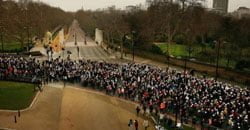“The spirit of Petrograd”, cried Sylvia Pankhurst on hearing
the news of a police strike in 1918. “The London police on strike. After that,
anything can happen.”
| Police march through London, 23rd Januar |
The ground is certainly shifting in Britain. There has been a
continual build up of public anger at the government’s attempt to impose a 2%
limit on public sector pay. For the first time in 21 years, the National Union
of Teachers is balloting for a national stoppage.
And there are the police. I knew there was something up when
the ‘Socialist Appeal’ office got a phone call from the ‘Police Review’ asking
for permission to republish an article from our website on the police strikes
of 1918-19. “There is a growing interest in this subject”, stated the caller.
Today, the government had told the police that their normal
pay rise would not be back-dated, unlike the police in Scotland who got the
full award. This meant they would get a paltry 1.9% rise, in effect a pay cut.
They were furious and making all kinds of threats against the Home Secretary
Jacqui Smith and Gordon Brown.
Police bloggers have been displaying their anger on
websites. One, who blogs under the name Another Constable, wrote: "Every
single colleague of mine is ranting at the moment. They are all openly
discussing going on strike too, should the opportunity ever arise… Morale
amongst my peers is lower than I have ever seen."
There is rebellion in the air. A pillar of the state is in a
mutinous mood. The Police Federation has threatened to ballot its 140,000
members about the right to strike, a democratic right that they lost after the
defeat of the 1919 police strike. There were many jokes circulating that
ex-miners would be volunteering to keep order on the picket-lines!
The police even decided to march through central London last
week. Some 25,000 police took part. The Met said the real figure was only
22,500, but they always underestimate demo figures, don’t they?
There was a sea of burly blokes with white base-ball caps.
They read ‘Fair P(l)ay for the Police’. There were very few placards and not a
riot-shield or miner’s helmet in sight. There was no chanting or whistling for
that matter. The only shouts came from the occasional bystander calling ‘Get
back to work’, to everyone’s amusement.
Despite the good nature, there was a bitterness not seen for
decades. In fact, not since the mid-1970s when the police were demanding up to
100% pay rises and revolution was not far off the agenda. There was talk of a police
strike and Jim Callaghan, the Labour PM, offering only 10%, stated he was
prepared to face a strike rather than give in.
However, a compromise was reached whereby police would drop
their demands to strike and have their pay linked to private sector deals,
which produced good rises for the next 28 years – up till now that is.
Today we have entered unchartered waters. Feelings are
running high and strike action is being discussed. In 1919, they faced Lloyd
George. Today they face Gordon Brown. In 1919 they were dubbed ‘Bolshevik Bobbies’,
today they will need to take a leaf out of the experience of their forefathers
if they are to get anywhere.
Whatever happens, such moods amongst the traditionally
backward police are a clear indication of the deep-seated indignation within
British society. The serious bourgeois strategists are alarmed by these
developments. Without doubt, we are heading for explosive times.
See also:
The ‘Spirit of Petrograd’? The 1918 and 1919 Police Strikes in Britain 07 November 2007






